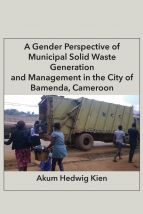A Gender Perspective of Municipal Solid Waste Generation and Management in the City of Bamenda, Cameroon

A Gender Perspective of Municipal Solid Waste Generation and Management in the City of Bamenda, Cameroon highlights the importance of recognizing and mainstreaming gender perspectives into municipal waste policies and strategies to achieve efficient waste management. It argues that although waste generation and management are influenced by gender politics and gendered divisions of labour, particularly at the household level, this relationship does not factor into Bamenda’s current municipal waste system. Its policies and strategies tend to focus on waste collection, transportation and, to a limited extent, disposal.
The failure of Bamenda’s municipal waste management system is commonly attributed to the lack of funding, technology, planning and expertise. However, the book argues that the lack of attention to the differentiated roles of men, women and children in waste generation and management is another major barrier to efficient waste management. Specifically, the book demonstrates how women’s household workloads (including food preparation and domestic cleaning activities) position women as the main agents of waste generation and management.
The book is based upon the PhD thesis of the author, Akum Hedwig Kien, completed at the Department of Women and Gender Studies of the University of Buea, Cameroon. Kien’s study focused on 47,585 households and nine markets in Bamenda as two main sources of municipal solid waste. The book addresses the following research questions:
- To what extent does the Bamenda City Council consider the role of women in household waste generation and handling in its policy and strategy of urban waste collection and disposal?
- Are there gender differences in environmental consciousness and behaviour when it comes to men's and women’s perceptions and management of household waste?
- Can waste generation in markets in Bamenda be characterized along gender lines?
- To what extent are Council resources and waste delivery strategies responsive to inhabitants’ waste management needs in general and to women’s gender needs in particular?
- What gender-sensitive sustainable waste management policy and strategies can be employed by the Bamenda City Council that will address current deficiencies and improve urban livelihood and sanitation?
The book concludes with a series of recommendations to the Bamenda City Council. These include:
- The Council should develop a more inclusive waste management system that involves the sources of municipal solid waste generation. This should include rules and guidelines at the household and market levels focusing on waste avoidance, minimization, separation and recycling.
- The Council should promote a waste economy that seeks to transform waste from a liability to an asset through legislation, regulation and funding.
- The Council should encourage environmentally sustainable practices, particularly with regard to the location, construction and use of landfill or dump sites.
- The Council should mainstream gender in its municipal solid waste management policies and strategies by recognizing and addressing women’s needs. This includes improving access to communal bins and increasing collections in consultation with households.
Book note prepared by Kate Goh
Search the Book notes database
Our Book notes database contains details and summaries of all the publications included in Book notes since 1993 - with details on how to obtain/download.
Use the search form above, or visit the Book notes landing page for more options and latest content.
For a searchable database for papers in Environment and Urbanization, go to http://eau.sagepub.com/

